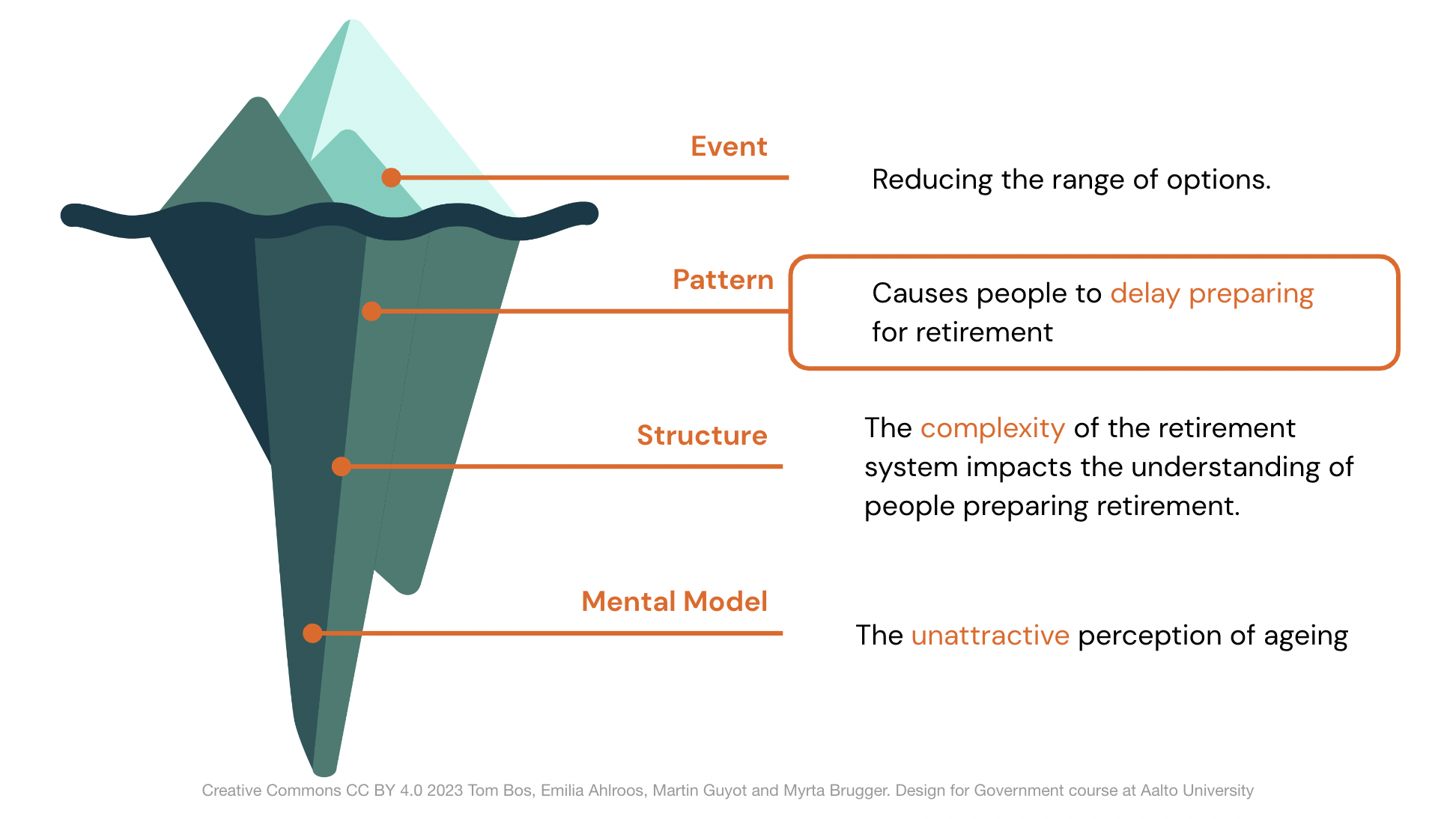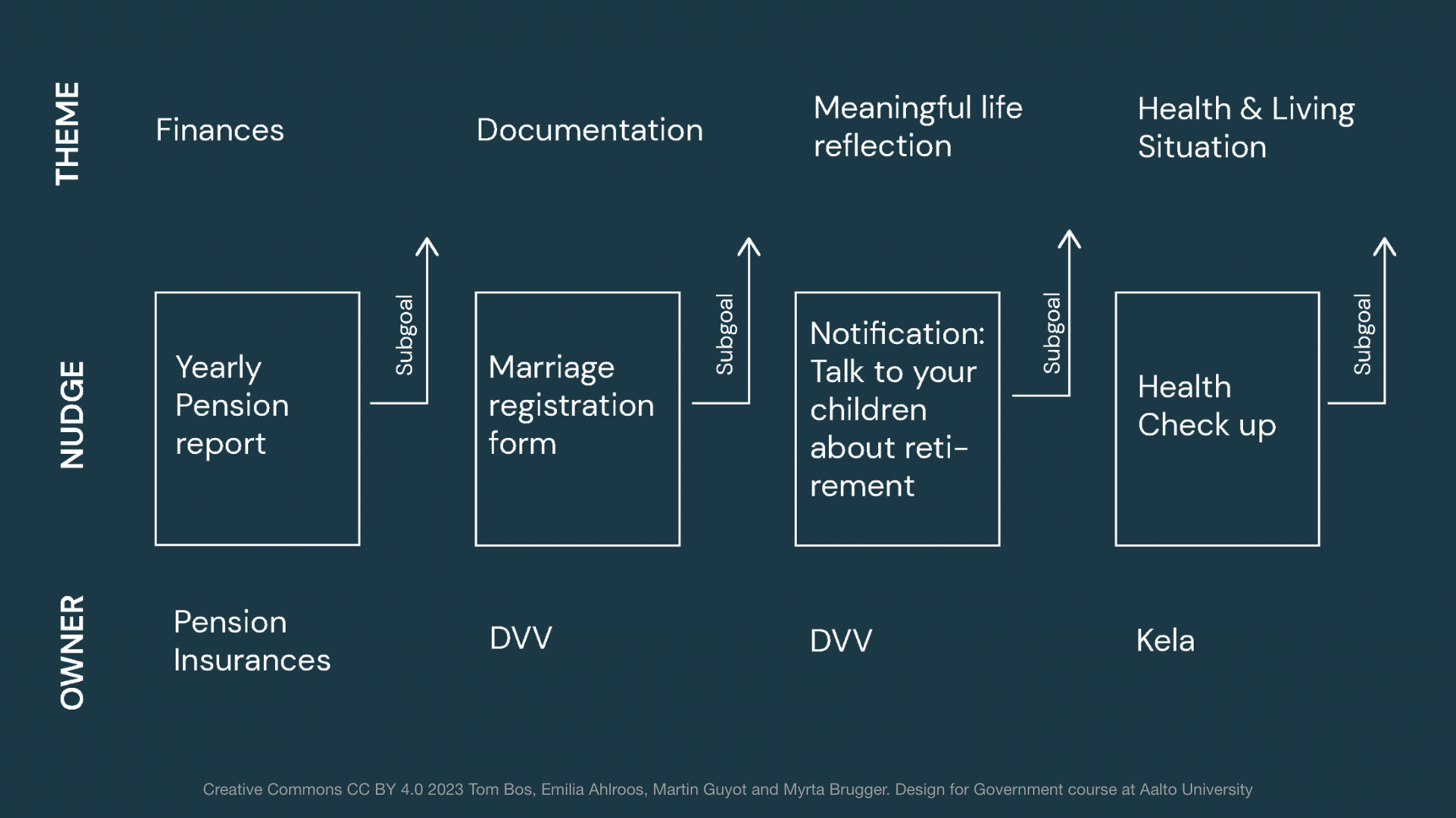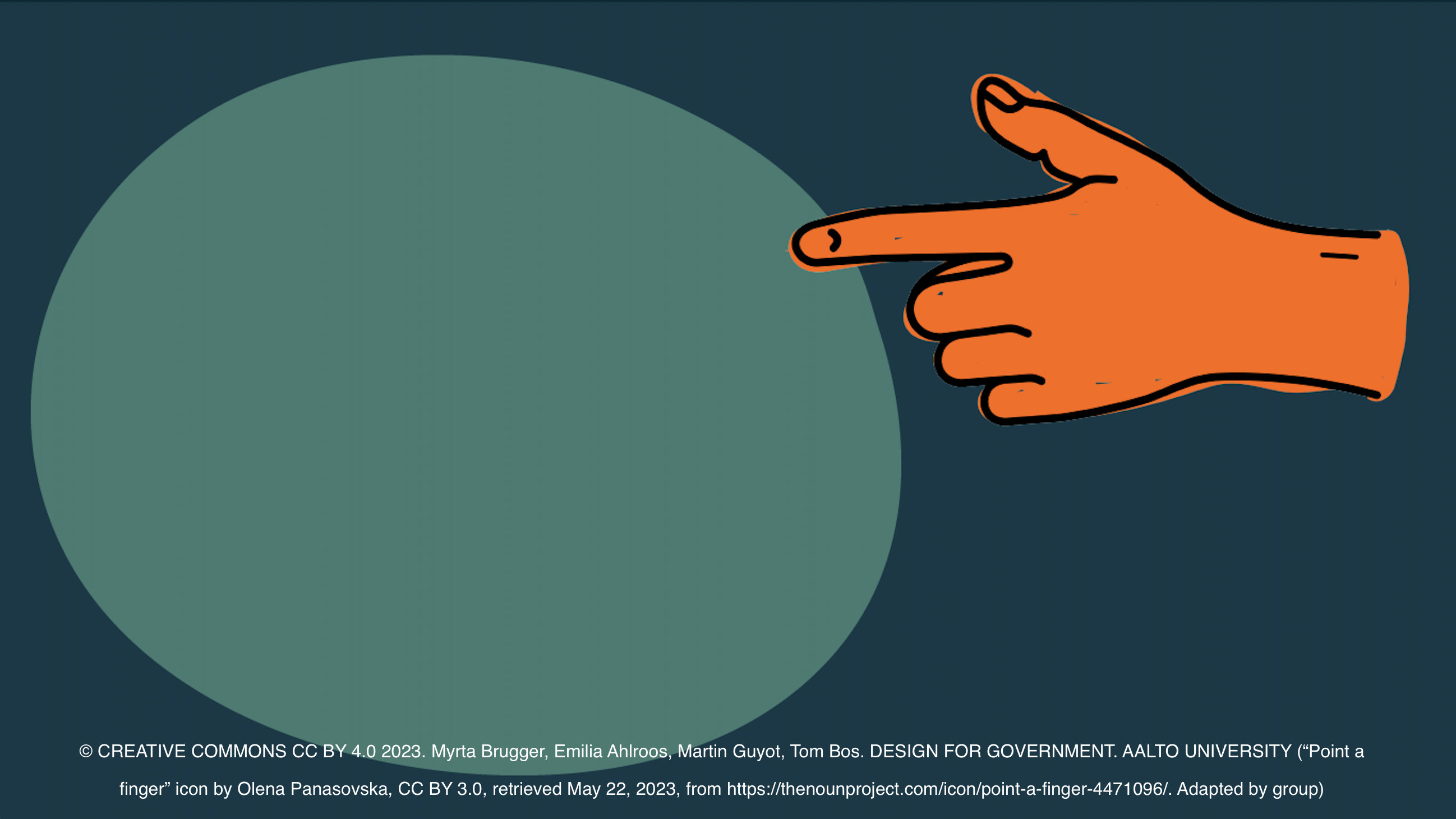This blog post reports on work-in-progress within the DfG course. The post is written by group 1C working in collaboration with the Digital Population and Data Services (DVV) and the Ministry of Finance (VM) on the project ‘Life events for a dignified old age’. The group includes Myrta Brugger and Emilia Ahlroos from the Collaborative and Industrial Design program, Martin Guyot from the Creative Sustainability program, and Tom Bos from Aalto Business School.
Written by: Emilia Ahlroos
I want to be a retiree
When I was 12 years old I said to my grandmother that I want to be a retiree. She thought that it was so hilarious and even today she sometimes reminds me of that. The reason for this comment must have been the example that I have seen from my grandparents. Their retirement seems meaningful and dignified, at least in the eyes of their grandchild. Of course, there have been difficulties, but all in all, when I think about our project brief for “dignified old age”, I think about the life my grandparents have.
Early preparation gives you more options in the future
There are many things that affect your retirement, for example, a social life, a support network, health, and your personal financial situation. In our desk research, we came across a comment from VTKL’s podcast (The Finnish Association for the Welfare of Older Adults) which stated that everyone should prepare for these five themes in advance: finances, housing, health, documents, and a meaningful life (Siltanen & Ihalainen, 2023, 6:55). If you start the preparation early, more options will be available to you when the time to make decisions comes around. Even though we are preparing in other aspects of life, our research tells us that most people are not preparing for their retirement. Our two insights revealed that the complexity of the retirement system and the negative perceptions of aging are behind this lack of preparation. As changing the Western culture of not wanting to get old is difficult, especially in twelve weeks, our scope was not to change the system but rather accept it as it is and try to make a difference in other ways. For this, we used the iceberg model by Meadows. We decided to intervene at a pattern level to help people understand the relevance of starting to prepare earlier. (Meadows, 2008)

Nudging retirement
Our final proposal is based on the idea of nudging, a concept from behavioral economics. (Thaler et al., 2013) Nudging means that we ‘push’ and encourage people to do something they wouldn’t otherwise do. This would happen by giving them small ‘hints’ and ‘tasks’. At the same time, these nudges would spark reflection about retirement. Also, by spreading these nudges over a longer period of time, we are able to structure this complex and long process. There are multiple things you can do before retirement, and when splitting it into smaller pieces, by using nudges and the idea of sub-goals and reflection (Becker et al., 2020) the preparation no longer seems that intimidating and overwhelming.
How would this nudging happen you may think? Well, the idea is to have multiple nudges, in different stages of life and it would happen on the existing platforms, e.g. suomi.fi and OmaKela. In our proposal, we have examples for four nudges. One nudge is related to finances and it would be included in the yearly pension report after turning 30. The second would nudge to prepare documentation. This could happen, for example, when a person gets married and it could be part of the documents one needs to fill out when registering a marriage. The third nudge is about meaningful life reflection and it would happen intergenerationally through retiring parents. When a parent retires, DVV (Digital Population and Data Services Agency) sends them a reminder to start the conversation about the retirement process and what are their hopes for the future with their children. The fourth nudge is under the theme of health and living situation and it is part of Kela’s health checkup that will take place when turning 55. This nudge could encourage people to think about their living situation and whether it will work in case of an accident or eventually when they get older.
In an ideal scenario, these different nudges in different moments of life would encourage people to start reflecting on how they want their life to be in the future and start the preparation earlier. And because we don’t know what kind of nudges are the most efficient to make a change, we encourage DVV, VM (The Finnish Ministry of Finance), and other stakeholders to experiment to find the most efficient outcome.

“Preparation makes it easier and lighter for you to be because you know that things are okay. For certain things that you cannot fully influence, you have done your best – that is preparation. Preparing for old age or preparing for life, whichever you want to call it.”
– Ihalainen, 2023, 18:47
Western culture has a negative perception of aging
There are strong negative perceptions about retirement because in our society we don’t want to think about getting old. On the other hand, finiteness is part of life, and even though it awakens difficult feelings, it can also work as a reminder for us to make choices that help us to live the meaningful life that makes us happy. To achieve that, we need to reflect on our life and prepare well in advance.
Retirement is a lifelong journey
The main takeaway from this project is that retirement isn’t just one life event that happens one day and then suddenly you become an elderly person. Retirement is, in fact, a lifelong journey. Because to have enough options to achieve a retirement that is meaningful for you, you need to start preparing early enough. Rather than seeing retirement as a negative thing that needs to be avoided, we should see it as another chapter of our life that can offer new experiences and add more meaningful things to our lives.
Over a decade after my wish of being retired, I still see retirement in a positive light. But now I also understand that I can help myself achieve the retirement my grandparents are fortuned to live. So, as this project comes to an end, I want to challenge you, who are reading this, to start reflecting on what kind of life you want to live and what kind of future you dream of. Maybe there are already things that you can do to achieve your dreams.
References:
Siltanen, T., & Ihalainen, A. (Hosts). (2023, Feb 20). Vanhuuteen varautumisen ensimmäinen jakso. (No. 3) [Audio podcast episode]. In PöllöAreena. VTKL. https://open.spotify.com/episode/6oMKsiVcsKiLS8SJMzBwHp?go=1&sp_cid=c9e45a894346f58aa72d4c7f4e8216be&utm_source=embed_player_p&utm_medium=desktop&nd=1
Meadows, D. H. (2008). Why systems surprise us. In Thinking in systems: A primer (pp 86-110). Chelsea green publishing.
Thaler, R., H., Sunstein, C., R., & Balz, J. P. (2013). Choice architecture. In Shafir, E. (Ed.) The Behavioral foundations of public policy, 25, 428–439.
Becker, L., Jaakkola, E., & Halinen, A. (2020). Toward a goal-oriented view of customer journeys. Journal of Service Management, 31(4), 767–790. https://doi.org/10.1108/JOSM-11-2019-0329
The DfG course runs for 14 weeks each spring – the 2023 course has now started and runs from 27 Feb to 31 May. It’s an advanced studio course in which students work in multidisciplinary teams to address project briefs commissioned by governmental ministries in Finland. The course proceeds through the spring as a series of teaching modules in which various research and design methods are applied to address the project briefs. Blog posts are written by student groups, in which they share news, experiences and insights from within the course activities and their project development. More information here about the DfG 2023 project briefs.

